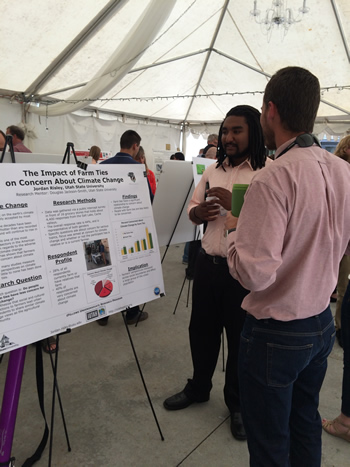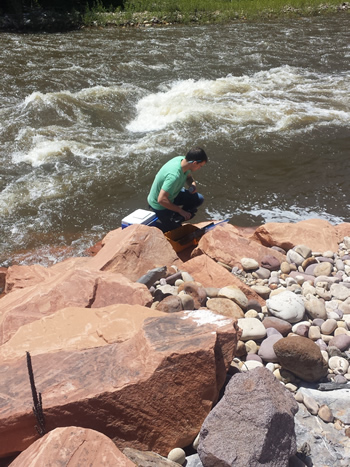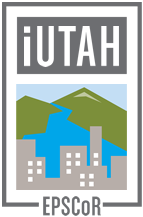Education and Outreach News
March 8, 2017
Achieving Broader Impacts in Research - A Symposium on March 31
What are Broader Impacts and why should scientists care? Have you ever submitted a great research proposal that promises high value to society but it has been rejected? One possible reason might be that it doesn’t provide enough information about how society will benefit from your research, specifically underserved and diverse communities. This is where broader impacts enter.
The National Science Foundation (NSF) and other federal research agencies are increasingly emphasizing the need to justify not only the “intellectual merit” of proposed research, but also its “broader impacts.” The latter refers to the potential of the proposed project to benefit society and contribute to the achievement of specific, desired societal outcomes.
The “Reflecting and Expanding on Our Broader Impact” forum was developed as a collaboration between iUTAH EPSCoR and the University of Utah’s Office of the Vice President for Research to address this topic. The event takes place on Friday, Mar. 31, and is free and open to faculty, students other research and education practitioners from across the state. The morning session, including keynotes and panel discussion, starts at 8:30 a.m. at the University of Utah, College of Pharmacy and Health Sciences Education Buildings, Salt Lake City UT.
The forum is fortunate to have the National Alliance for Broader Impacts (NABI) chair, Susan Renoe, an adjunct professor of Anthropology and director of the Broader Impacts Network at the University of Missouri, as a keynote speaker presenting on Broader Impacts For Engaged Scholarship. NABI is a national network of universities, professional societies and informal science organizations, which offers an excellent overview of broader impacts. In a second keynote, Chinweike Eseonu, assistant professor of Industrial and Manufacturing Engineering at Oregon State University, will share lessons learned from Implementing A Community-Engaged Research Program.
We invite students, faculty, and researchers to attend and promise that you will walk away with a better understanding of broader impacts and how they affect your funding.
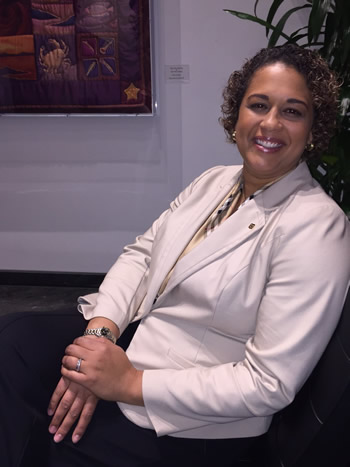
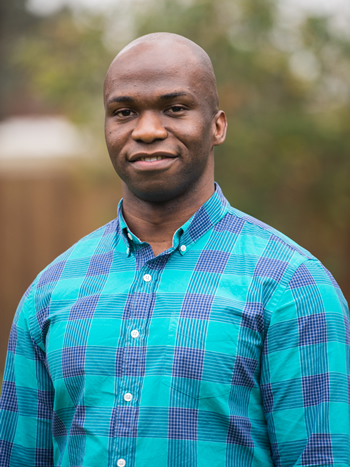
Credit Chinweike Eseonu.
March 8, 2017
iUTAH Students Present At Undergraduate Research Conference
Undergraduate students from across the state, including 16 students working on iUTAH research, were selected to present posters/presentations at the 2017 Utah Conference on Undergraduate Research (UCUR) on Friday, February 17, at Utah Valley University in Orem UT.
Students from Southern Utah University, University of Utah, Utah Valley University, and Westminster College presented iUTAH research, in collaboration with faculty Research Catalyst Grants and the iUTAH iFellows undergraduate research experience. For many students, like SUU senior, Hailey Wallace, this was their first UCUR conference. Wallace worked with mentors from SUU and UU, and other students testing the ability of green roofs to contribute to urban invertebrate biodiversity.
“It has been an amazing experience to be a part of undergraduate research," said Wallace. “I am very grateful have been involved in this project since the beginning, and been able to have multiple projects of my own stemming from the main work, as well as present the research at multiple venues.”
Wallace plans to use what she learned and continue her education as a graduate student in the Environmental Science and Management program at Portland State University in the fall. Below are topics and students presenting at UCUR:
Effect Of Phragmites Australis Control On Utah Lake Water Quality
Student(s): Arthur Evensen, Joshua Jackson, Jake Wood, Paul Morris, Ibrihim Alhassan, Kyle Fordham, and Victor Sanjinez (UVU)
Mentor(s): Eddy L Cadet
A Comparative Analysis On Attitudes Toward Drinking Water Quality Between Utah And The Nation
Student(s): Adam James Whalen (2016 iUTAH iFellow), and Meaghan McKasy (UU)
Mentor(s): Sara Yeo
Quantifying Nutrient And Trace Metal Input To Utah Lake From Orem Wastewater Treatment Effluent
Student(s): Sydney Hoopes and Serena Smith (UVU)
Mentor(s): Weihong Wang, and Eddy Cadet
Use Of Green Infrastructure to Increase Invertebrate Biodiversity In The Built Environment
Student(s): Hailey Wallace and Andrew Carlson (SUU)
Mentor(s): Jacqualine Grant, Matthew Weeg, Youcan Feng, and Steven Burian
Effect Of The Disappearance Of The Deep Brine Layer On Trace Element Uptake Into Great Salt Lake Food Webs
Student(s): Madelene Trentman, Abby Scott, and Alexandria Martin (Westminster College)
Mentor(s): Frank Black
Methylmercury In The Great Salt Lake
Student(s): Alexandria Martin (Westminster College)
Mentor(s): Frank Black
UCUR was created to showcase the best undergraduate work from students across the state of Utah. Undergraduates from all disciplines are invited to apply for the conference. Submissions to UCUR 2018, which held at SUU, will be due in the fall. For more information, visit www.ucur.org.
Press: UVU Press Release
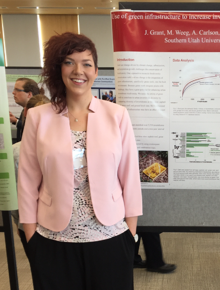
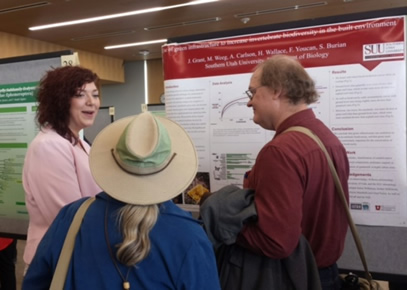
February 6, 2017
iUTAH Students Present Research on Capitol Hill
Undergraduate students from the University of Utah and Utah State University presented their research for Utah lawmakers in the rotunda of the state Capitol in Salt Lake City on Tuesday, Jan. 24, 2017. Due to weather-related issues, USU did not make it down for the event, and will showcase their work at a later date. Two iUTAH students were selected to present research:
Hyrum Tennant, USU student & iUTAH trainee, (mentor Beth Neilson)
Project title: Groundwater Influences on the Logan River Watershed
Adam Whalen, UU student & 2016 iUTAH iFellow (mentor Sara Yeo)
Project title: A Comparative Analysis of Attitudes Toward Drinking Water Between Utah and the Nation
The iUTAH project involves students in a wide range of academic disciplines all related to water research in the state. While participating in research, students learn valuable skills on poster development and engaging in one-on-one and group presentations. As a double major in Communication and Political Science, Adam Whalen said he was especially “excited about how involvement with research can have real world implications in government, and by extension, society,” adding that “this presentation was a wonderful hybrid of my academic interests."
“Capitol Hill also proved to be a fantastic venue, it had an aura of importance and historicity that made me feel like I was a part of something greater for the state of Utah,” said Whalen. “It one of the best experiences in my undergraduate career. It sparked the same creative drive I had during my time as an iFellow, and reminded me of why I got started in research in the first place.”
More information on the event and participants is available in the articles listed below.
Press: UU News | Utah State Today | Deseret News | Daily Utah Chronicle
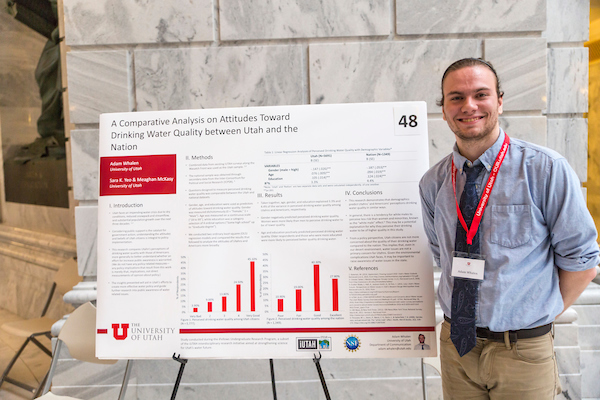
Credit: UU Office of Undergraduate Research
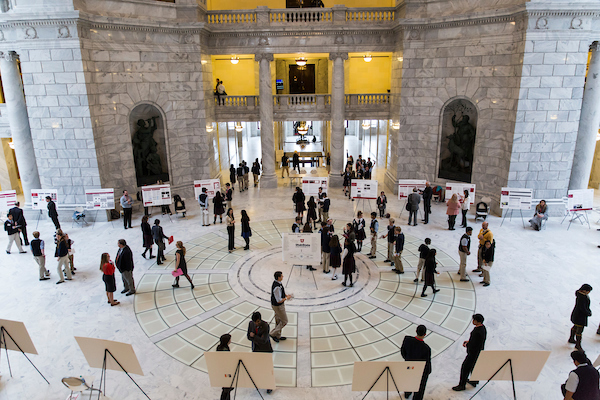
January 12, 2017
iUTAH Making a Difference Brochure
Our state faces water issues that have economic, ecological, and human consequences. To sustain Utah’s water resources, we must be prepared to address a highly complex array of environmental processes and social concerns. Since 2012, the researchers, educators, and resource managers in iUTAH have been working together to understand the water issues that have economic, ecological, and human consequences. Our research is contributing to predicting the effects of natural events and human choices on water systems, creating better understanding of threats and measurements of Utah’s water systems, and informing citizens and policy makers about water and the ways we can sustain it for future generations.
With the help of the iUTAH Leadership Team, we have recently put together a 16-page brochure on “Utah’s Water Future.” The brochure features the efforts and successes of the iUTAH project while outlining “how iUTAH is making a difference” in the state. Features in the piece include the concerns, consequences, and contributions that are being made through your research, training, and educational efforts. While printed copies of the brochure are available for distribution, a digital version is available online in the brochures sections of the website, here.
Creating the piece is just the first step in raising awareness of these efforts. We ask that you review this piece, use it in your presentations, and let us know new ways that it should be used to reach key stakeholders in the state. The knowledge we’re gaining and the tools we’re developing will help water professionals and other decision makers make informed choices and take appropriate action to secure Utah's water future.
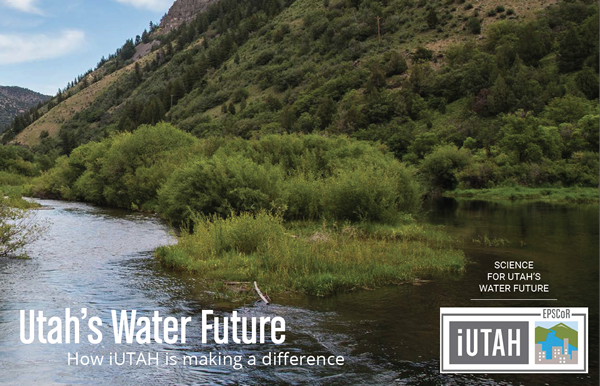
January 10, 2017
UTAH iFellows Now Accepting Applications For Summer 2017
iUTAH is offering the iFellows Undergraduate Research Program for the fifth straight year on May 15 - July 28, 2017. The iFellows Program provides an opportunity for undergraduate students to gain first-hand research experience in the labs of iUTAH project scientists. iFellows are placed at either the U of U, USU, or BYU for the summer, and participate in valuable research, mentorship, science training and communication opportunities throughout the program.
We are recruiting undergraduate students from any Utah institution of higher learning. Students from institutions that primarily serve undergraduates and students of diverse cultural backgrounds are especially encouraged to apply. The program recruits students to assist with iUTAH-related research, which cover a wide range of academic disciplines. Applicants from any university major who are interested in research and water-related issues in Utah are welcome to apply.
Visit the iFellows Program page for information and to apply:
• The 2017 Program Application
• Information on the program, which offers a $4,500 stipend
• Recruitment materials (including printable flyers and a brief presentation)
Applications are due on February 10, 2017. Please contact Ellen Eiriksson, iUTAH Education, Outreach and Diversity Coordinator, for more information. We welcome you to share this exciting opportunity with students and faculty in your network.
